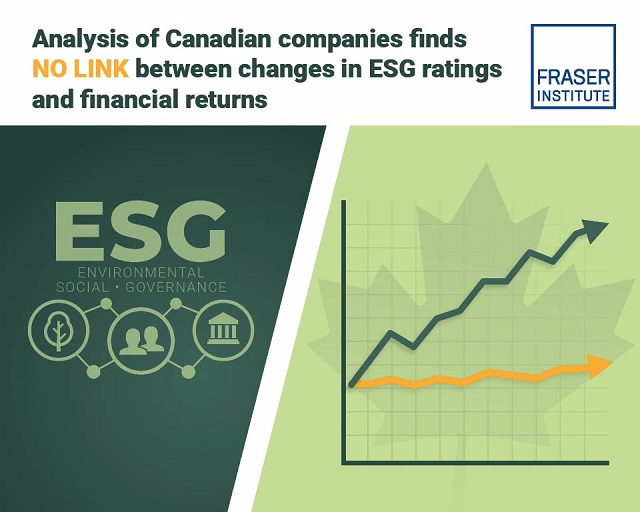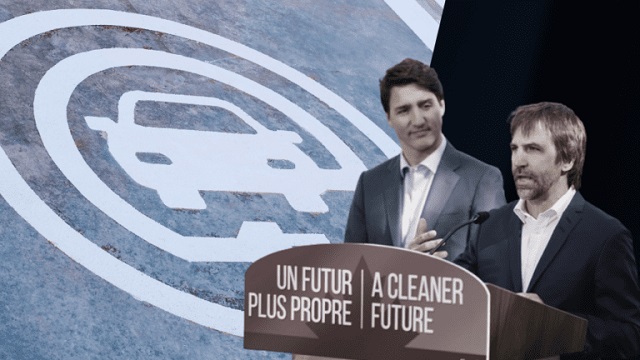Economy
ESG rankings have no significant effect on investment performance of Canadian public companies

From the Fraser Institute
Despite claims to the contrary, the ESG rankings of publicly-traded Canadian companies have no significant effect on investment returns, finds a new study published today by the Fraser Institute, an independent, non-partisan Canadian
public policy think-tank.
“While government regulators and some industry executives promote the benefits of ESG investing, there’s no evidence of significant advantages for investors,” said Steven Globerman, senior fellow at the Fraser Institute and author of ESG Investing and Financial Returns in Canada.
Environmental, social and governance (ESG) is a movement designed to pressure businesses and investors to pursue larger social goals. In Canada, due to government securities regulation, publicly-traded companies must disclose ESG-related
information on a range of issues including environmental impact, human rights, and equity and inclusion.
ESG advocates claim that government-mandated ESG disclosures improve the financial performance of companies.
However, the study—the first empirical analysis of the relationship between changes in the ESG rankings of Canadian publicly-traded companies and equity returns— tracked 310 companies on the Toronto Stock Exchange from 2013 to 2022 and found no significant relationship between changes in ESG ranking (upgrades or downgrades) and financial returns, as measured by the price of shares and dividend income.
In other words, advocates for greater ESG disclosures cannot accurately claim—based on Canadian evidence—that requiring companies to provide more information for ESG rankings will significantly affect the financial performance of Canadian
investors.
“Better performance on ESG rankings simply does not translate into better financial performance for Canadian firms,” Globerman said.
- ESG investing incorporates environmental (E), social (S), and governance (G) considerations into investment decisions. Until recently, ESG-themed investing comprised an increasing share of investments made by professional money managers and retail investors.
- Financial industry executives and regulators who have promoted ESG-themed investing argue that it will enhance investment performance either by increasing asset returns and/or by reducing investment risk.
- However, empirical studies, on balance, find no consistent and statistically significant evidence of a positive relationship between the ESG rankings of individual companies or portfolios of companies and the financial performances of those companies or investment portfolios.
- Most empirical studies have focused on US-based publicly traded companies. To our knowledge, this study is the first to focus on returns to ESG-themed investing for Canadian-based public companies.
- Using data from MSCI, a leading ESG ratings provider, we estimate the statistical relationship between changes in ESG rankings of companies and changes in equity returns for those companies using a sample of 310 companies listed on the Toronto Stock Exchange between 2013 and 2022.
- Our study finds that neither upgrades nor downgrades in ESG ratings significantly affect stock market returns.
 Read the Full Report
Read the Full Report
Author:
Automotive
Opposition Conservatives fail in attempt to “Pull the Plug” on Carney’s Electric Vehicle Mandate

From Conservative Party Communications
After a Lost Liberal Decade of rising costs and slow growth, Mark Carney wants you to think his government has moved on from Justin Trudeau’s failed policies.
Unfortunately for Canadians, Carney has no interest in scrapping one of his predecessor’s most reckless and costly ideas: a zero-emissions vehicle (ZEV) mandate starting next year that will ultimately ban Canadians from buying gas-powered cars by 2035.
As the required percentage of ZEV sales increases each year, the government wants to force manufacturers and importers to buy costly credits of up to $20,000 for every EV they are short of the Liberals’ quota – a huge expense that will ultimately be passed on to, and paid by Canadian consumers.
That’s why Conservatives have introduced a motion to end this harmful scheme, ensuring Canadians can continue to buy the kind of car they need at a price they can afford.
EVs are great for many families, who should always be free to purchase the vehicle of their choice. But for many Canadians – who live in cold environments or travel long distances – they can be practically useless, especially without the infrastructure to power them.
One government report estimated that changes to Canadian infrastructure required to support a transition to ZEVs could cost up to $300 billion by 2040. On top of the costs already imposed on manufacturers and buyers, this policy will require billions in new tax dollars and government debt.
No wonder one 2024 survey found two thirds of Canadians find the 2035 target is unrealistic.
As unjust tariffs threaten an automotive sector which contributes billions to our GDP, the Liberals continue to put their elitist, top-down ideology ahead of the livelihoods of hundreds of thousands of proud Canadian workers.
While Carney talks about change, Conservatives are here to deliver. That’s why we’re fighting to repeal the ZEV mandate, scrap the industrial carbon tax and cancel Liberal fuel standards. We trust Canadians – not Ottawa’s Liberal elite – to make the best decisions for themselves and their families.
It’s time to put Canadians back in the driver’s seat.
Business
Canada’s critical minerals are key to negotiating with Trump

From Resource Works
The United States wants to break its reliance on China for minerals, giving Canada a distinct advantage.
Trade issues were top of mind when United States President Donald Trump landed in Kananaskis, Alberta, for the G7 Summit. As he was met by Prime Minister Mark Carney, Canada’s vast supply of critical minerals loomed large over a potential trade deal between North America’s two largest countries.
Although Trump’s appearance at the G7 Summit was cut short by the outbreak of open hostilities between Iran and Israel, the occasion still marked a turning point in commercial and economic relations between Canada and the U.S. Whether they worsen or improve remains to be seen, but given Trump’s strategy of breaking American dependence on China for critical minerals, Canada is in a favourable position.
Despite the president’s early exit, he and Prime Minister Carney signed an accord that pledged to strike a Canada-US trade deal within 30 days.
Canada’s minerals are a natural advantage during trade talks due to the rise in worldwide demand for them. Without the minerals that Canada can produce and export, it is impossible to power modern industries like defence, renewable energy, and electric vehicles (EV).
Nickel, gallium, germanium, cobalt, graphite, and tungsten can all be found in Canada, and the U.S. will need them to maintain its leadership in the fields of technology and economics.
The fallout from Trump’s tough talk on tariff policy and his musings about annexing Canada have only increased the importance of mineral security. The president’s plan extends beyond the economy and is vital for his strategy of protecting American geopolitical interests.
Currently, the U.S. remains dependent on China for rare earth minerals, and this is a major handicap due to their rivalry with Beijing. Canada has been named as a key partner and ally in addressing that strategic gap.
Canada currently holds 34 critical minerals, offering a crucial potential advantage to the U.S. and a strategic alternative to the near-monopoly currently held by the Chinese. The Ring of Fire, a vast region of northern Ontario, is a treasure trove of critical minerals and has long been discussed as a future powerhouse of Canadian mining.
Ontario’s provincial government is spearheading the region’s development and is moving fast with legislation intended to speed up and streamline that process. In Ottawa, there is agreement between the Liberal government and Conservative opposition that the Ring of Fire needs to be developed to bolster the Canadian economy and national trade strategies.
Whether Canada comes away from the negotiations with the US in a stronger or weaker place will depend on the federal government’s willingness to make hard choices. One of those will be ramping up development, which can just as easily excite local communities as it can upset them.
One of the great drags on the Canadian economy over the past decade has been the inability to finish projects in a timely manner, especially in the natural resource sector. There was no good reason for the Trans Mountain pipeline expansion to take over a decade to complete, and for new mines to still take nearly twice that amount of time to be completed.
Canada is already an energy powerhouse and can very easily turn itself into a superpower in that sector. With that should come the ambition to unlock our mineral potential to complement that. Whether it be energy, water, uranium, or minerals, Canada has everything it needs to become the democratic world’s supplier of choice in the modern economy.
Given that world trade is in flux and its future is uncertain, it is better for Canada to enter that future from a place of strength, not weakness. There is no other choice.
-

 Alberta2 days ago
Alberta2 days agoCentral Alberta MP resigns to give Conservative leader Pierre Poilievre a chance to regain a seat in Parliament
-

 Alberta1 day ago
Alberta1 day agoCalls for a new pipeline to the coast are only getting louder
-

 Daily Caller2 days ago
Daily Caller2 days ago‘Not Held Hostage Anymore’: Economist Explains How America Benefits If Trump Gets Oil And Gas Expansion
-

 Censorship Industrial Complex1 day ago
Censorship Industrial Complex1 day agoJordan Peterson reveals DEI ‘expert’ serving as his ‘re-education coach’ for opposing LGBT agenda
-

 Business1 day ago
Business1 day agoCanada’s economic pain could be a blessing in disguise
-

 Alberta2 days ago
Alberta2 days agoAlberta pro-life group says health officials admit many babies are left to die after failed abortions
-

 Alberta1 day ago
Alberta1 day agoUnified message for Ottawa: Premier Danielle Smith and Premier Scott Moe call for change to federal policies
-

 Education1 day ago
Education1 day agoStudents can’t use AI to cheat on standardized tests







